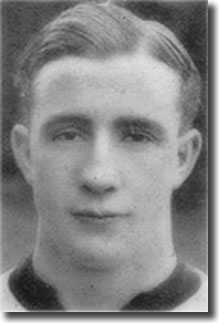 Born:
Stockton-on-Tees, 1892
Born:
Stockton-on-Tees, 1892
There is some doubt about exactly which James it was who played for
Leeds City in November 1916, but it is widely thought that it was Middlesbrough
winger Billy.
Billy James began his playing days in his native North East with the
noted junior club Eston United. He joined First Division Middlesbrough
as an 18-year-old in 1910, playing intermittently for Boro and scoring
a handful of goals before the outbreak of the First World War.
James transferred his allegiances to Portsmouth during the conflict,
after Middlesbrough closed down operations for the duration.
With left winger Tommy Mayson injured, Leeds
City asked James to play for them at home to Nottingham Forest on 11 November
1916. With the game 1-1 at the interval, James came into his own in the
second period, as reported by the Yorkshire Post: 'The City showed
huge improvement in the second half, and one particularly fine rally of
their forwards ended in James just missing with a shot from the wing.
James continued to be much in evidence, and Lawrenson needed to show exceptional
ability in clearing two of his centres. The City attacked persistently,
though with a noticeable lack of finish and with a degree of over eagerness
which caused Price in particular to miss two chances. Many corners were
blocked and well cleared, but finally it was a corner taken by J
Stephenson which gave the home side the lead. The player put in a
beautiful flag kick which placed the ball for Sherwin to head it direct
into the corner of the net. This happened ten minutes from the finish,
and in the last minute C Stephenson added another goal from a centre by
James, making the result Leeds City 3 Nottingham Forest 1.'
In contrast, the Leeds Mercury's JRB claimed that James 'was hardly
at home', and he never appeared again for the Peacocks.
After the resumption of peacetime football, James came to prominence
with Portsmouth in the Third Division, scoring three times in 22 league
appearances before signing for West Ham in 1920. He spent two years in
Second Division football before fading out of the top class game.
James died in 1960.











 Born:
Stockton-on-Tees, 1892
Born:
Stockton-on-Tees, 1892